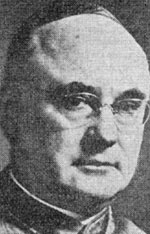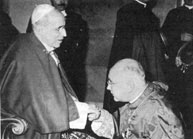Chapter 9
The Pius-Spellman-Dulles Secret Scheme
The ultimate objectives of the operation, in addition to those already described, were two: (1) The creation of a solid homogenous Catholic community upon which Diem and the U.S. could rely for the prosecution of the war against the North, and against domestic guerrilla units. (2) The erection of a Catholic controlled state, from which the Vatican could operate its many-branched-religious administration in Asia.
The U.S., as the Vatican's principal ally, supported both objectives in so far that it regarded them the necessary instruments, via which it could carry out its main strategy. At this stage, its goals being: the hastening of the end of the Vietnamese war, the future pacification and subsequent stabilization of the entire region.
While to the Vatican, these objectives, in political and military terms, were worthy of support, yet, behind and beyond them, it had a scheme of far more import than either, as far as its long range religious global policy was concerned. The scheme could be summarized in the setting of a model Catholic state in the heart of Southeast Asia. Its creation entailed an administration which was totally Catholic, which was inspired by a nucleus of Catholics, which were 100 per cent reliable, religiously and ideologically, notwithstanding the fact that they had to rule a vast majority which practiced Buddhism. The achievement of this goal necessitated first the neutralization of those who might object to the scheme; secondly the elimination of those who would actively oppose it; and ultimately the removal of anyone or anything which did not accept the Catholicization of South Vietnam.
The scheme had been the brain child of Pope Pius XII, and had been supported by Cardinal Spellman, and had been abetted by John Foster Dulles. It had been approved by sundry U.S. politicians of the inner circle of the Catholic lobby in Washington, not to mention by certain elements at the CIA, many of whom were non-Catholics. Also by certain political strategists at the Pentagon, whose main concern was, that as long as the scheme served American strategic objectives, everything went.
Operation resettlement began in earnest. Agencies of all kinds were set up for the purpose. The Diem government spawned them daily. The most efficient and the most effective being provided by the U.S., or rather by the American taxpayers, the majority of whom are Protestants. U.S. money was poured in at once. The U.S. gave an instant 40 million dollars to resettle the Catholics. This meant that every Catholic, who had left North Vietnam, was given about 89 dollars each by Protestant America to reinforce the Catholic administration of Diem. This, it must be remembered, in a country where the average income of the average Buddhist was only 85 dollars per year.
Cardinal Spellman, one of the ablest of the American cardinals. He was a skillful financial operator and a vigorous politician. He became one of the main inspirers of the Cold War because of his belief that Bolshevism, as incarnated in Soviet Russia, was intrinsically evil and must be contained and if possible, destroyed. He was a personal friend of Pius XII since the days when Pius was Papal Nuncio in Germany and helped the Nazis form a legal government in January, 1933. Pius XII used Spellman as the spokesman for the Vatican in America to influence politicians, businessmen, military leaders, and the Catholic lobby. He was active in persuading the U.S. to select Diem and support him as president of South Vietnam. He was made Vicar General of the U.S. Armed Forces and called the GI's the "Soldiers of Christ" in his frequent visits to the Vietnam war front. He was convinced that the war was a just war to save Christian civilization. |
The U.S. taxpayer supported the Catholics for more than two years. In addition to pouring out millions of dollars, it sent millions of tons of food, surplus agricultural instruments, vehicles and uncountable goods of kinds, everything covered and paid for by the U.S. "Relief Program." This American never-ending abundance was distributed and therefore controlled by the "Catholic Relief Services," a branch of the Diem machinery. The government and the Catholic hierarchy worked hand in hand.
State officials consulted the Catholic priests, as to where the U.S. relief or money should go, or to whom it should be given The result was that the Catholics got everything, whereas those who were not Catholic were lucky if they got a meal or a few cents.
Cardinal Spellman and Pope Pius XII. Pius always had deep affection for Cardinal Francis Spellman, Archbishop of New York, whom he raised to Cardinal in February, 1946. These two consistently promoted the Cold War, never condemning the U.S. plans to use the atom bomb, even after President Truman's declaration that "it looks like World War III is near." Pius XII continued to support the U.S. lobby advocating "an atomic preventive war." When in 1954 the U.S. Army planned a nuclear attack on the Vietnamese, besieging the French at Dien Bien Phu, the same Vatican supported lobby gave their approval of the proposal. During the Eisenhower Administration, when the Dulles brothers, Spellman and thus Pius XII helped formulate U.S. policies, the U.S. military considered dropping from one to six 31-kiloton bombs on the Vietnamese forces. The weapons were three times as powerful as the Hiroshima bomb. This scheme to use nuclear weapons against Vietnam was disclosed in declassified material in the first volume of a 17-volume official history of the Vietnam War published in 1984 by the Army's historical office. |
This in contrast to the Catholic communities which got the bulk of the U.S. donation. Individuals or Buddhist villages were practically ignored, whether they had come from the North or were native Southerners. The result was that the U.S. aid, food, technicians and general assistance was given almost exclusively to Catholics. The latter, to court the favor of the American Relief Fund Authorities, organized themselves into paramilitary militias "to fight the Communists and all those who supported them," meaning the Buddhists.
These Catholic armed groups were encouraged by American personnel, with the help of the Vietnamese Catholic bishops. The latter inspired and blessed numberless local self-defense Catholic groups. These became known as "Mobile Catholic Units, for the Defense of Christendom"—that is, for the defense of the Catholic Church. They sprang up everywhere and were soon labeled the "Sea Swallows."
In addition to the above, Diem saw to it that the new Catholic immigrants were given key positions in the government, the regular army, the police, from the top down to provincial and district levels. So that soon many officials and officers who were not Catholic were replaced or downgraded, if not dismissed altogether. The Catholicization of the state machinery was being promoted in record time, it must be remembered, with the active approval of the U.S.
That the U.S. was behind this incredible sectarian operation was demonstrated by the fact that the U.S. mission itself set up the Vietnam Bureau of Investigations. This open para-military unit was supported by a rural Catholic militia composed of more than 40,000 men.
Every echelon of Diem's new administration was filled with practicing Catholics. To make sure that only Catholics got all the key positions, Diem terminated the 500 year democratic tradition of the local villages by which chiefs were elected by the population and replaced them with the Catholics who had arrived from the North. His personal slogan: "Put your Catholic officers in sensitive places. They can be trusted."
To add more weight to such undemocratic structure, Diem then charged the Catholic priests with the administration of the land owned by the Church, which meant that in almost every village, the local Catholic priest, became a quasi public official, endowed with religious, administrative and political powers. Besides this, Diem then hastened government aid to Catholic organizations of all kinds. He gave extra help—to Catholic units—for good work. The vigilantes and the para-military groups, including sections of the army were employed to build and to repair Catholic buildings. Catholic propaganda was transmitted by the national radio. Catholics were hastily promoted to the top ranks in the Army and in the bureaucracy. The bishops were treated as state ministers in all public ceremonies.
The massive result of this blatant partiality for anything or anybody who was Catholic was that many decided to join the Catholic Church. More than 33,000 people became Catholic by the end of 1954. Officials in the national or local administration were converted, not to risk endangering their careers. Ambitious individuals did the same. Others became Catholics, having discovered that Catholics got the best food, clothing and money, indeed having found out that even when the U.S. sent relief—food for the Vietnamese population at large, only the Catholics were assured of help, the Buddhists more often than not, got nothing.
This outrageous favoritism eventually came into the open in the U.S. when finally it was discovered how all the aid which had been sent to South Vietnam and which had been distributed mostly by the "Catholic Relief Services" during two whole years, had been deliberately used to persuade Buddhists to become Catholic. Having proved such mishandling of American aid, the U.S. officials at long last refused to give more aid to Catholic Relief Service.
The inner Catholic and military cliques in South Vietnam and in the U.S. exercised pressure on Capitol Hill to such effect that eventually the ruling was changed. Yet, notwithstanding their efforts to hide the scandal for fear of Protestant reaction at home, it came to light that the hundreds of thousands of tons of food sent by the U.S., and meant for an estimated 700,000 people—"of all denominations" was received by only 270,000 individuals.
One American general involved in the request for food to be given to the Catholic Relief Services, was none other than General William Westmoreland. Curiously enough, this leading general became himself a convert to the Roman Catholic Church while conducting military operations in South Vietnam, an illustrious victim of Diem's Catholic proselytizing. It was eventually discovered that, whereas the Catholics got their food absolutely free, the Buddhists had to pay for it. This applied not only to funds which had been sent by Catholic organizations from the U.S., but also to funds which had been sent by the U.S. administration to be used for the relief of all independently of their religious affiliations.
The result of such deliberate discriminations was that thousands of individuals, or families and indeed in many instances of entire villages, became Catholics, encouraged by the Catholic authorities, or by the Diem government. Many changed their religion not only to retain their jobs, but to avoid bodily transfer, better known as resettlement. Resettlement more often than not, spelled the loss of the houses, or of the lands of those who had been resettled. By being transferred elsewhere, they had to leave behind all they had in terms of physical assets, or of social, family and religious ties.
Diem's main objective was a fundamental one as far as his short and long range policy was concerned. He wanted to strengthen Catholic communities with additional Catholic communities, to transform them into reliable centers from which to promote his religious and political objectives
Editor's Note
Cardinal Spellman was called Cardinal "Moneybags" at the Vatican and his headquarters in New York City - St. Patrick's Cathedral on 5th Avenue - was called "Comeonwealth Avenue."

